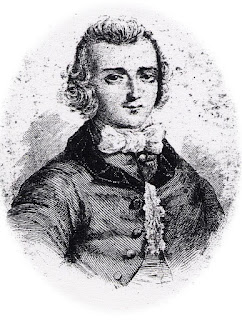Philosopher Louis de Jancourt - How to Become an Enlightened Writer
 |
| Public Domain Wikimedia Commons |
Louis de Jaucourt,
(1704-1779) was a great scholar of the Enlightenment, born in Paris, who
studied theology in Geneva. He influenced his readers by his intelligent use of language and metaphor, and by inviting their complicity through sound psychological processes.
Overcoming the Loss of a Manuscript
Today, we are lucky as there is a degree of safety in storing our work online. It might be plagiarised but it is unlikely to be lost. It wasn't so in times past.
The saddest thing about this great man's life was
that he worked for twenty years to produce a work of six volumes on Anatomy,
but the ship carrying his manuscript sank on its way to Amsterdam, and his
labours were entirely lost.
Yet, undeterred, he went on to contribute more
articles to the Encyclopédie than any other writer, and he did this
voluntarily. He was already wealthy so he was willing to participate without
payment. He wasn't as well-known or as popular as some other Enlightenment
figures, but later his writing was recognised and valued as important and
relevant.
He was strongly opposed to slavery and upheld the rights of black
people.
Liberté
by de Jaucourt - the Importance of Classical References as a Psychological Ploy
Like other
Enlightenment thinkers, Jaucourt conformed to its conventions in his emphasis
on the use of reason and his insistence on questioning established beliefs. In
his important work, Liberté, de Jaucourt says that freedom of
thought should guard against prejudice.
He uses classical references to add
weight to his arguments, for example, relating to the Greek Goddess of Wisdom,
Minerva. Such classical references are easily understood and upheld by his
educated readership, a clever literary device encouraging reader-identification
and, at the same time, making the reader unprepared for any subordinate
comments or arguments that may ensue.
The Charm of Illusion when Choosing Your Words
He us wary of the supernatural, advising resistance and
promoting open-mindedness. He uses the phrase "charm of illusion"
which both acknowledges and excuses the natural human attraction towards the
mystical and shows that he is sympathetic towards this weakness. In this way,
he leads the reader gently towards the subject core of his thought, that of
freedom in "matters of religion".
This choice of words is, I believe,
deliberate. To use the words "matters" in the phrase is, in itself,
less threatening than to speak merely of religion. Consequently, he is
attacking "matters pertaining to religion" rather than religion
itself. This implies that only the interpretations are faulty, or that
religious concepts are inaccurate, and thus avoids attacking religion.
Religion, as a "thing in itself" is not directly judged or
criticised. De Jaucourt carries the reader along his train of thought, inviting
his or her complicity, as if anxious to avoid alienating the reader before he
has made his crucial point.
It is interesting that de Jaucourt speaks not of the
person, but of the mind, as if we ourselves are subject to the direction of the
mind and not necessarily responsible for its misconceptions. It implies that
the mind is at the mercy of our childhood education.
He tries to help the
reader feel safe in questioning religious beliefs by acknowledging the
difficulty and danger in doing so. It is as though the mind and the past are
operating separately from our inner selves and from our sense of truth and rightness.
Words Engraved Upon the Heart
He warns how easily reason is inhibited and admits:
"This should not astonish us" and he speaks, emotively, of ideas
which are "engraved upon our heart, printed on our souls."
He
does not overuse emotive language, nevertheless he chooses his words carefully.
It seems as though, while trying to persuade the reader to question religious
dogma, he does not choose to deny us our hearts or souls. I wonder if
this is an example of irony, but I do not think so.
"Such is our
superstition that we think we are honouring God by the shackles we put on our
reason." This is a striking metaphor which he uses like a
revelation, "as if the truth had to fear appearing in full daylight."
De Jaucourt's beliefs and his gentle and sympathetic
approach appear to forgive dogma although he does not agree with it,
endeavouring to understand and to make excuses while not actually condoning it.
Consistently, he uses the pronouns "we" and "us" and
"ourselves" as though he includes himself as having been similarly
deceived, which approach is, in itself, fairly disarming. Like other
Enlightenment authors, his attitude is questioning and reasoning in order to
reach a judgement, and his use of emotive and metaphorical language supports
his arguments, but he differs in his manner of inviting the reader's
complicity, and in the diplomacy of his approach.
Sources:
- De Jancourt, Liberté
- Voltaire, Men of Letters
- Philosophe, Anonymous
-->
Copyright Janet Cameron


Comments